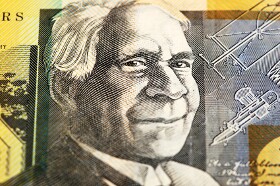The Australian dollar continued to rise, logging a third consecutive daily gain. This time, it is easier to explain the currency’s rally as it followed the better-than-expected GDP print released during the trading session. Economic data from China, Australia’s biggest trading partner, was atrocious, but it had a little impact on the movement of the Aussie.
The Australian Bureau of Statistics reported that gross domestic product rose by 0.5% in the December quarter of 2019, beating the consensus forecast of a 0.4% increase. The previous quarter’s gain got a positive revision from 0.4% to 0.6%. Annualized growth was 2.2%, exceeding market expectations of a 2.0% increase and accelerating from the previous quarter’s 1.7% rate of growth. Of course, it is important to remember that the figures reflect the state of the Australian economy before the onslaught of the coronavirus, and figures for the first quarter of this year will likely be much worse.
Released overnight, a report showed an increase of the Australian Industry Group/Housing Industry Association Australian Performance of Construction Index from 41.3 to 42.7 in February. While the reading below 50.0 indicates that the industry was still contracting, the pace of decline has slowed. The report commented on the result:
The milder decline in the Australian PCI ® in February reflected slower reductions in activity, new orders and supplier deliveries. However, the persistence of soft demand in residential construction at the aggregate level over an extended period saw the Australian PCI ® employment index fall at a steeper rate in the month.
As for Chinese economic data, the Caixin China Services PMI demonstrated an unprecedented collapse from 51.8 in January to 26.5 in February. Being below the neutral 50.0 level, the indicator showed a sharp decline in business activity — the first on the record. Unsurprisingly, the coronavirus outbreak was the main driving force behind the collapse as the report explained:
The vast majority of panel members identified the outbreak of the coronavirus as the key driver of reduced activity, with firms facing extended company closures after the Chinese New Year and strict travel restrictions.
AUD/USD advanced from 0.6582 to 0.6612 as of 15:17 GMT today. EUR/AUD slumped from 1.6965 to 1.6812. AUD/JPY gained from 70.48 to 71.05.
If you have any questions, comments, or opinions regarding the Australian Dollar, feel free to post them using the commentary form below.



Be First to Comment